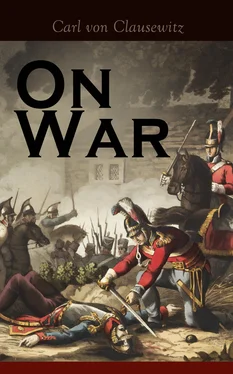1 ...7 8 9 11 12 13 ...48
12. A SUSPENSION IN THE ACTION OF WAR UNEXPLAINED BY ANYTHING SAID AS YET.
However insignificant the political claims mutually advanced, however weak the means put forth, however small the aim to which military action is directed, can this action be suspended even for a moment? This is a question which penetrates deeply into the nature of the subject.
Every transaction requires for its accomplishment a certain time which we call its duration. This may be longer or shorter, according as the person acting throws more or less despatch into his movements.
About this more or less we shall not trouble ourselves here. Each person acts in his own fashion; but the slow person does not protract the thing because he wishes to spend more time about it, but because by his nature he requires more time, and if he made more haste would not do the thing so well. This time, therefore, depends on subjective causes, and belongs to the length, so called, of the action.
If we allow now to every action in War this, its length, then we must assume, at first sight at least, that any expenditure of time beyond this length, that is, every suspension of hostile action, appears an absurdity; with respect to this it must not be forgotten that we now speak not of the progress of one or other of the two opponents, but of the general progress of the whole action of the War.
13. THERE IS ONLY ONE CAUSE WHICH CAN SUSPEND THE ACTION, AND THIS SEEMS TO BE ONLY POSSIBLE ON ONE SIDE IN ANY CASE.
If two parties have armed themselves for strife, then a feeling of animosity must have moved them to it; as long now as they continue armed, that is, do not come to terms of peace, this feeling must exist; and it can only be brought to a standstill by either side by one single motive alone, which is, THAT HE WAITS FOR A MORE FAVOURABLE MOMENT FOR ACTION. Now, at first sight, it appears that this motive can never exist except on one side, because it, eo ipso, must be prejudicial to the other. If the one has an interest in acting, then the other must have an interest in waiting.
A complete equilibrium of forces can never produce a suspension of action, for during this suspension he who has the positive object (that is, the assailant) must continue progressing; for if we should imagine an equilibrium in this way, that he who has the positive object, therefore the strongest motive, can at the same time only command the lesser means, so that the equation is made up by the product of the motive and the power, then we must say, if no alteration in this condition of equilibrium is to be expected, the two parties must make peace; but if an alteration is to be expected, then it can only be favourable to one side, and therefore the other has a manifest interest to act without delay. We see that the conception of an equilibrium cannot explain a suspension of arms, but that it ends in the question of the EXPECTATION OF A MORE FAVOURABLE MOMENT.
Let us suppose, therefore, that one of two States has a positive object, as, for instance, the conquest of one of the enemy’s provinces—which is to be utilised in the settlement of peace. After this conquest, his political object is accomplished, the necessity for action ceases, and for him a pause ensues. If the adversary is also contented with this solution, he will make peace; if not, he must act. Now, if we suppose that in four weeks he will be in a better condition to act, then he has sufficient grounds for putting off the time of action.
But from that moment the logical course for the enemy appears to be to act that he may not give the conquered party THE DESIRED time. Of course, in this mode of reasoning a complete insight into the state of circumstances on both sides is supposed.
14. THUS A CONTINUANCE OF ACTION WILL ENSUE WHICH WILL ADVANCE TOWARDS A CLIMAX.
If this unbroken continuity of hostile operations really existed, the effect would be that everything would again be driven towards the extreme; for, irrespective of the effect of such incessant activity in inflaming the feelings, and infusing into the whole a greater degree of passion, a greater elementary force, there would also follow from this continuance of action a stricter continuity, a closer connection between cause and effect, and thus every single action would become of more importance, and consequently more replete with danger.
But we know that the course of action in War has seldom or never this unbroken continuity, and that there have been many Wars in which action occupied by far the smallest portion of time employed, the whole of the rest being consumed in inaction. It is impossible that this should be always an anomaly; suspension of action in War must therefore be possible, that is no contradiction in itself. We now proceed to show how this is.
15. HERE, THEREFORE, THE PRINCIPLE OF POLARITY IS BROUGHT INTO REQUISITION.
As we have supposed the interests of one Commander to be always antagonistic to those of the other, we have assumed a true polarity . We reserve a fuller explanation of this for another chapter, merely making the following observation on it at present.
The principle of polarity is only valid when it can be conceived in one and the same thing, where the positive and its opposite the negative completely destroy each other. In a battle both sides strive to conquer; that is true polarity, for the victory of the one side destroys that of the other. But when we speak of two different things which have a common relation external to themselves, then it is not the things but their relations which have the polarity.
16. ATTACK AND DEFENCE ARE THINGS DIFFERING IN KIND AND OF UNEQUAL FORCE. POLARITY IS, THEREFORE, NOT APPLICABLE TO THEM.
If there was only one form of War, to wit, the attack of the enemy, therefore no defence; or, in other words, if the attack was distinguished from the defence merely by the positive motive, which the one has and the other has not, but the methods of each were precisely one and the same: then in this sort of fight every advantage gained on the one side would be a corresponding disadvantage on the other, and true polarity would exist.
But action in War is divided into two forms, attack and defence, which, as we shall hereafter explain more particularly, are very different and of unequal strength. Polarity therefore lies in that to which both bear a relation, in the decision, but not in the attack or defence itself.
If the one Commander wishes the solution put off, the other must wish to hasten it, but only by the same form of action. If it is A’s interest not to attack his enemy at present, but four weeks hence, then it is B’s interest to be attacked, not four weeks hence, but at the present moment. This is the direct antagonism of interests, but it by no means follows that it would be for B’s interest to attack A at once. That is plainly something totally different.
17. THE EFFECT OF POLARITY IS OFTEN DESTROYED BY THE SUPERIORITY OF THE DEFENCE OVER THE ATTACK, AND THUS THE SUSPENSION OF ACTION IN WAR IS EXPLAINED.
If the form of defence is stronger than that of offence, as we shall hereafter show, the question arises, Is the advantage of a deferred decision as great on the one side as the advantage of the defensive form on the other? If it is not, then it cannot by its counter-weight over-balance the latter, and thus influence the progress of the action of the War. We see, therefore, that the impulsive force existing in the polarity of interests may be lost in the difference between the strength of the offensive and the defensive, and thereby become ineffectual.
If, therefore, that side for which the present is favourable, is too weak to be able to dispense with the advantage of the defensive, he must put up with the unfavourable prospects which the future holds out; for it may still be better to fight a defensive battle in the unpromising future than to assume the offensive or make peace at present. Now, being convinced that the superiority of the defensive 5(rightly understood) is very great, and much greater than may appear at first sight, we conceive that the greater number of those periods of inaction which occur in war are thus explained without involving any contradiction. The weaker the motives to action are, the more will those motives be absorbed and neutralised by this difference between attack and defence, the more frequently, therefore, will action in warfare be stopped, as indeed experience teaches.
Читать дальше












